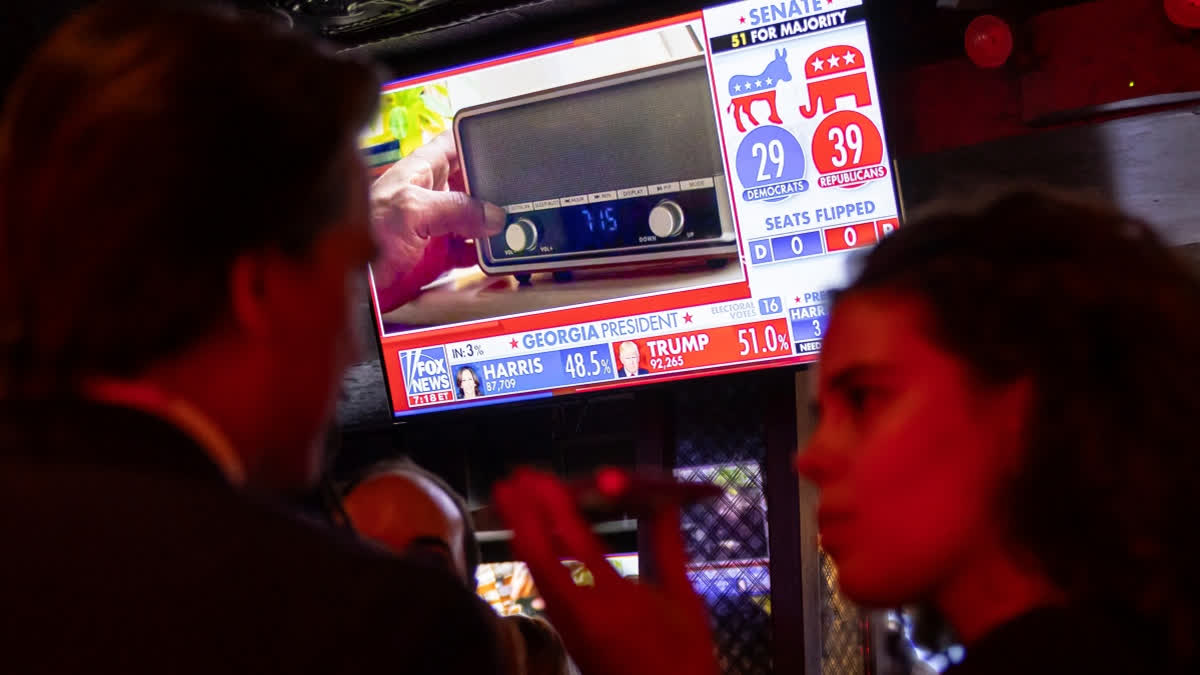Washington: Even with the outcome uncertain Tuesday night, the 2024 presidential election already has exposed the depths of a fractured nation as the candidates navigated political shifts based on class, race and age under the near-constant threat of misinformation and violence.
Early data suggests that Republican Donald Trump may benefit from some of the shifts more than Democrat Kamala Harris. But not since the 1968 election, when the nation was torn over racial strife and the Vietnam war, have the divisions seemed so apparent. The biggest conclusions, however, so far may be the most obvious.
The United States is poised to elect either its first female president in Harris or its first president with a felony conviction in former president Trump, whose enduring political strength through chaos — much of it his own making — has carried few political costs so far. With votes still being counted across the country, here are some early takeaways:
There is a new battleground map and scrambled coalitions
Black voters — men and women — have been the bedrock of the Democratic Party, and Democrats have had a strong pull for Latino voters. It's been the same with young voters. But preliminary data from AP VoteCast, an expansive survey of more than 115,000 voters nationwide, suggested that the groups shifted in Trump's direction.
Voters under age 30 represent a fraction of the total electorate, but about half of them supported Harris. That’s compared to the roughly 6 in 10 who backed Biden in 2020. Slightly more than 4 in 10 young voters went for Trump, up from about one-third in 2020.
Another shift that emerged was among Black and Latino voters, who appeared slightly less likely to support Harris than they were to back Biden four years ago, according to AP VoteCast.
About 8 in 10 Black voters backed Harris, down from the roughly 9 in 10 who backed Biden. More than half of Hispanic voters supported Harris, but that was down slightly from the roughly 6 in 10 who backed Biden in 2020. Trump’s support among those groups appeared to rise slightly compared to 2020. Trump boasted throughout the fall that he would get more support from Black men and Latino men than he had before.
Harris, meanwhile, went after more educated voters — including moderate Republicans — repelled by Trump. It may turn out that the Trump era is not a permanent realignment of the major party coalitions. But it’s clear that old coalitions and longstanding understandings of how to win the White House simply do not apply with Trump in the mix.
A new president will take charge of a nation with deep fissures
Whether Harris or Trump ends up behind the Resolute Desk, the 47th president will lead a nation with deepening political and cultural fissures and a worried electorate.
AP VoteCast found that about 4 in 10 voters considered the economy and jobs the most important problem facing the country. Roughly 2 in 10 voters said the top issue is immigration, an anchor of Trump’s argument, and about 1 in 10 picked abortion, a pillar of Harris’ campaign.
In a reminder of just how unusual this election has been, about 1 in 4 Trump voters said the assassination attempts against him were the most important factor in their vote.
But when asked what most influenced their vote, about half of voters cited the future of democracy. That was higher than the share who answered the same way about inflation, immigration or abortion policy. And it crosses over the two major parties: About two-thirds of Harris voters and about a third of Trump voters said the future of democracy was the most important factor in their votes. That’s not surprising given the realities of the Trump era and the rhetoric of the campaign.
Trump refused to acknowledge his 2020 defeat and watched his supporters ransack the U.S. Capitol on Jan. 6, 2021, as Congress convened to certify Democrat Joe Biden’s victory. Trump even mused two days before Election Day that he “shouldn’t have left” the White House after repeatedly promising retribution to his political enemies.
Harris, by the end of the campaign, joined other critics — including some of Trump’s former White House chief of staff — in describing the former president as a “fascist.” Trump, meanwhile, labeled Harris a “fascist” and a “communist.”
He then told voters that the multiple criminal prosecutions against him prove that Democrats are the true “threat to democracy” and in the final days of the campaign stepped up his debunked claims that U.S. elections are rigged against him.
Questions about ‘election integrity’ persist — thanks to misinformation
Trump spent the closing days of the election aggressively promoting baseless claims about the integrity of the election, insisting that would lose only if Democrats cheat. Not long after, he claimed on social media, without evidence, that there was “a lot of talk about massive CHEATING in Philadelphia.”
There is no credible information pointing to significant fraud in this election — or the last one, despite Trump's claims to the contrary. A broad coalition of top government and industry officials, many of them Republicans, found that the 2020 election was the “most secure” in American history."
At the same time, a misinformation campaign promoting false instances of election fraud is spreading online. The FBI on Tuesday issued a statement highlighting two examples of its name and insignia being misused in election-related videos. One of them featured a fabricated press release alleges that the management of five prisons in Pennsylvania, Georgia, and Arizona rigged inmate voting and colluded with a political party.
“This video is also not authentic, and its contents are false,” the FBI said.
Mars and Venus: Abortion, ‘bro’ politics illuminate gender voting differences
It was the first presidential election after the Supreme Court overturned Roe v. Wade and ended a woman’s national right to terminate a pregnancy. It was also the first time that a Republican presidential candidate overly courted males with a hypermasculine approach.
And it appears to have mattered. Both Harris’ and Trump’s advisers expected a historic “gender gap” between the two candidates, with women making up a clear majority of Harris’ supporters and men providing the clear majority of Trump’s total.
AP VoteCast, meanwhile, found that about 1 in 10 voters said abortion is the top issue facing the country, reinforcing the newfound salience of an issue that barely registered for voters four years ago.
About one-quarter of voters said that abortion policy was the single most important factor for their vote, while close to half said it was an important factor, but not the most important.
To be sure, women have trended more Democratic in national politics for years, while men have trended more Republican. But the widening gap simply underscores how fractured the American electorate has become.
The Year of Billionaires underscores the power of money in politics
Elon Musk, one of the world’s wealthiest men, became Trump’s favourite campaign sidekick in the closing weeks. Musk relished the spotlight, as he has since he bought Twitter, changed its name to X and shaped the social media platform’s political identity toward his own.
Musk ploughed tens of millions of dollars — a fraction of his fortune — into a turnout operation intended to help Trump. The former president promised to make Musk a key part of his would-be second administration, potentially giving him sweeping control over federal regulations and bureaucracy.
On the Democratic side, Bill Gates and Michael Bloomberg each gave a pro-Harris super PAC $50 million, according to the New York Times.
Read More



